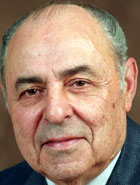Jack Botwinick, Ph.D., professor emeritus of neurology in the School of Medicine and of psychology in Arts & Sciences, died in St. Louis on Sunday, Feb. 12, 2006, after a brief illness. He was 83.
Born in Brooklyn, N.Y., Jan. 9, 1923, Botwinick earned a doctorate from New York University in 1953.

He was a research scientist in the laboratory on aging at the National Institute of Mental Health and a faculty member in the Gerontology Center at Duke University before coming to Washington University as professor of psychology in 1968. He earned a joint appointment as professor of neurology in 1982.
In addition to his successful psychology textbook, Aging and Behavior, first published in 1973, Botwinick played a key role in the development of the Washington University Alzheimer’s Disease Research Center (ADRC).
In 1979, WUSTL neurologist Leonard Berg, M.D., in collaboration with Martha Storandt, Ph.D., professor of psychology in Arts & Sciences, and Botwinick, received a three-year grant from the National Institute of Mental Health to study the natural history of Alzheimer’s disease, and the Memory and Aging Project (MAP) was born.
“My mentor, Leonard Berg, always has been deeply grateful for the critical role played by Jack Botwinick and his protégée, Martha Storandt, in establishing in 1979 the MAP at Washington University School of Medicine that subsequently developed into the Alzheimer’s Disease Research Center,” said John C. Morris, M.D., the Harvey A. and Dorismae Hacker Friedman Distinguished Professor of Neurology, professor of pathology and immunology and director of the ADRC.
“Jack’s involvement resulted in immediate credibility for MAP’s longitudinal neuropsychological studies, as he already was widely acknowledged for his expertise in cognitive aging. Jack and Martha also brought intellectual rigor and research experience to the MAP team. When I joined MAP and the ADRC in 1984, Jack had assumed an advisory role but continued to contribute importantly to our research mission.
“It is not an overstatement to say that the ADRC may not have not have come into being here at Washington University School of Medicine without Jack Botwinick. He was recognized for his seminal contributions to the ADRC at our 20th anniversary celebration in October 2005.”
In 1985, the medical school was selected as one of five new Alzheimer’s Disease Research Centers and was given a series of major research grants from the National Institute on Aging.
“Jack’s superb mentoring ability aided many people as they began their research careers in the field of aging,” Storandt said. “I was very fortunate to be one of those.”
Botwinick is survived by his wife, Joan, three daughters and four granddaughters.